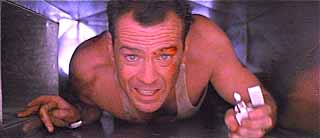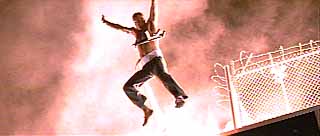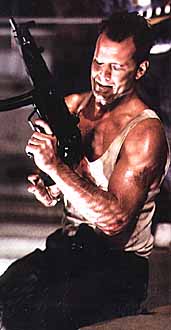
A key scene that subverts John's simple construction as a Hard Body Hero is when John is holed up in a bathroom, tending to his significant wounds. He admits to Al that he does not expect to survive. What is of greatest importance to John at this moment is that his wife know that he is sorry, that he was wrong: "I should have been behind her more." This is not a traditional Heroic moment: John is visibly suffering, he acknowledges that he may fail and die, and he says he is sorry to a woman (though through a surrogate). As Peter Schwenger writes in Phallic Critiques: "it is by talking that one opens up to another person and becomes vulnerable. It is by putting words to an emotion that it becomes feminized" (45). John's self-awareness, his acknowledgement of his emotions and his failings, saves him from being constructed as a Hero. In Red River, John Wayne and Montgomery Clift resort to a ridiculous wrestling match rather than either admitting that they were wrong or that they love each other: a woman has to say it for them.

The example of Sgt. Al Powell further confirms that, in Die Hard, vulnerability does not lessen a man. Though Al may be an impotent figure as a cop because he can't use a gun, he is not impotent as a man--his wife is pregnant. And Powell has John's respect: "I figured you for the streets, Al."
The bathroom scene is an essential step not only to John's eventual defeat of the bad guys, but toward his reunion with his wife, his true goal. When he personally comes to his wife's rescue, she sees him not as a heroic Hard Body, but as a suffering, damaged man. The McClanes finally eliminate Hans not through direct violence--John's shot was ineffective. Hans is hanging out the skyscraper window with a loaded gun, holding on to Holly by her Rolex. To save Holly, John must remove her Rolex from her wrist, allowing Hans to fall. Likewise, for their relationship to work, neither can hold on to objects of power--neither a Rolex or a badge. When John introduces Holly to Al, he chooses to introduce her as Holly Gennaro; she makes a similar choice when she corrects him with "Holly McClane." This is a scene of mutual recognition, not a restoration of male dominance.
Though the McClanes' reunion scene has been seen as a simple returning to conservative "family values," I feel that the scene has greater possibilities. When Al advises Holly, "You've got yourself a good man. You take care of him," it sounds to me like a reconfiguring of "take care of the little woman," as Al entrusts the protection of John to Holly. John acknowledges in the bathroom scene that he was wrong to not support his wife's career, so we have no reason to believe that Holly will leave Nakatomi or Los Angeles. Though Holly gives up the Rolex and takes back her married name, these are choices she makes to be equal to her husband, not subservient. Die Hard 2 maintains this positioning: John, now a member of the LAPD, has been spending the holidays with his children and in-laws in D.C.; Holly was detained in L.A. on business.
On the other hand, Hans Gruber is defeated through his continual misrecognition and underestimation of John. When an unarmed Hans runs into John, Hans cowers and pretends to be an escaped American hostage. John accepts Gruber as "Bill Clay," offering "Bill" a cigarette and a gun. But when Hans tries to shoot John, he learns that the gun is empty and that John has just seamlessly played Hans for the sucker. At the end of the film, Hans dismisses John as defeated and taunts John for his cowboy bravura: "Still playing the cowboy? Well, this time, John Wayne does not ride into the sunset with Grace Kelly." "It's Gary Cooper, asshole," replies John. In this exchange, Gruber has confused the hard-bitten Wayne with Gary Cooper's moral, reluctant marshall in High Noon. Simultaneously, Hans has again underestimated John, who has a trick up his sleeve--actually taped to his back. And John does ride off into the sunset (sunrise) with Holly.
The final examples of violence in this film do not come from John, but from those who protect him: Al shoots the resurrected terrorist, Holly punches out the reporter, and Argyle bursts through the parking garage gate. As a chain reaction to John's emotional strength through his vulnerability, those around John McClane are empowered.
John McClane in Die Hard anticipated the heroic man that has emerged in films of the 1990s. In films like The Hunt for Red October, Last of the Mohicans, Hero, Kindergarten Cop, Forrest Gump, and Crimson Tide, the heroic man no longer single-mindedly pursues his duty for a society that demeans and exploits him. He is a caring, family-oriented man who knows himself, and chooses for himself what is right. In The Changing Fictions of Masculinity, David Rosen saw the danger to the Hero--"Because these men can neither escape the ideal nor value and act upon experiences and feelings, they are doomed to pain" (219). He saw hope in our changing society for men and women: "the changes in technology favor those with patience, fine motor skills, quick reactions and good judgment" (214). The Duke favored a shotgun over a revolver because there were always men who were faster, and his characters often suffered from an inflexibility of thought. Roy Rogers provides a better model for this new, patient, and quick-witted man who never forgets to laugh at himself and always places his family first.
page 3 of 3

Go to Works Cited.
After 12 years as an arts/university administrator, Elizabeth Abele is currently a Ph.D. candidate in English at Temple University. She has presented papers at meetings of the Popular Culture Association, the Shakespeare Association of America, and Mid-Atlantic Popular Culture Association.
|


 John himself does not relish or get the adrenaline rush we expect from drafted Heroes: he's tired and he's supposed to be on vacation. "Come to the Coast. We'll have a few laughs," John ironically complains. The LAPD and FBI alike do not recognize John as on duty; even Al (a police officer who John reaches by walkie-talkie) tells him to hole up and let them do their job. Like Roy and Lethal Weapon's Murtaugh, and contrary to the audience's expectations, John McClane is a family man first, and not the slave of Heroic duty.
John himself does not relish or get the adrenaline rush we expect from drafted Heroes: he's tired and he's supposed to be on vacation. "Come to the Coast. We'll have a few laughs," John ironically complains. The LAPD and FBI alike do not recognize John as on duty; even Al (a police officer who John reaches by walkie-talkie) tells him to hole up and let them do their job. Like Roy and Lethal Weapon's Murtaugh, and contrary to the audience's expectations, John McClane is a family man first, and not the slave of Heroic duty.



 View an animated GIF of Hans' fall.
View an animated GIF of Hans' fall.